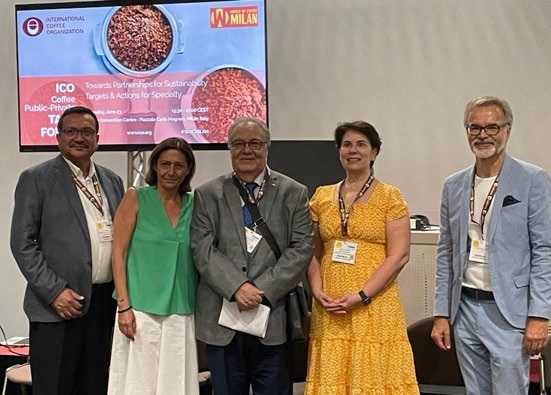LONDON, UK – On the occasion of the World of Coffee (WoC), held in Milan on 23 June, the ICO Coffee Public-Private Task Force organized a special event on ‘Towards Partnerships for Sustainability/Targets & Actions for Specialty’. The event aroused the interest of professionals and a large number of guests including, among others, ICO Members (Colombia, Honduras, El Salvador, Nicaragua and Papua New Guinea) as well as Conservation International, GCP, SCA, Illycaffè, Starbucks, Solidaridad, OLAM and CLAC.
Coffee production is one of the most important agricultural activities for the world economy, yet coffee sector stakeholders, particularly producing countries, face multiple environmental, economic and social challenges.
Through its Coffee Public-Private Task Force, the ICO takes a practical and holistic approach, promoting the co-responsibility of ICO importing and exporting member countries, the private sector, development partners and all coffee stakeholders to address these challenges and guarantee the long-term viability of the sector.
His Excellency Mr Iván Romero-Martínez, Ambassador of Honduras and Chair of the International Coffee Council (ICC), opened the event, highlighting the approval of the new International Coffee Agreement (ICA 2022) last week and stressing how this achievement represents “a great opportunity to increase and improve engagement with the private sector for the benefit of the global coffee sector”.
Facing sustainability issues in the coffee sector requires consensus-driven action, cross-sectoral approaches (landscape, finance, living income and living wage, etc.), as well as a balance between coffee supply chain solutions and cross-commodity approaches.
The event marked an occasion to highlight how the ICO Task Force represents a unique consensus-building model to agree and implement solutions, such as the creation and implementation of collaborative public-private partnerships to close the ‘living income gap’, to build ‘resilient coffee landscapes interventions’ that ensure sustainably produced and sourced coffee and enhanced market transparency and access, as well as to address the impact of new regulations on the production, trade, processing and consumption of coffee.
Welcoming the participants, ICO Executive Director Vanúsia Nogueira stated: “Shared challenges require joint solutions! To adapt to significant and constant changes in the global coffee sector and fit within the specialty coffee market and segment, the ICO Task Force serves as a unique model in the multilateral space as it plays an active part for involving all stakeholders in the overall sector transformation.
Only together, partnering within the ICO Task Force, will we be able to support multiple sector areas, such as the capacity to adapt to climate change, income diversification to reduce livelihood vulnerability, and the empowerment of women, young farmers and entrepreneurs”.
All participants agreed to put the ICO Task Force ideas into practice and stressed the need for increased involvement of consumers and the retail market. There is an urgent need for a public-private concerted action to enhance the sector’s sustainability, which is dependent on two key challenges: enabling farmers to achieve prosperity, with the living income being a mere steppingstone; and upgrading the coffee sector by repositioning from bulk to high-quality and specialty coffee production and adding value at origin.
The ICO Task Force event within the WoC Milan was an excellent opportunity to highlight public and private dialogue and actions as crucial to the implementation of effective national and international regulations and incentives for sustainable production practices which will advance sector-wide transparency. The event ended with a discussion on the need to support a resilient and inclusive coffee sector to ensure that future generations of coffee producers and consumers are committed to a sustainable future in coffee.


















